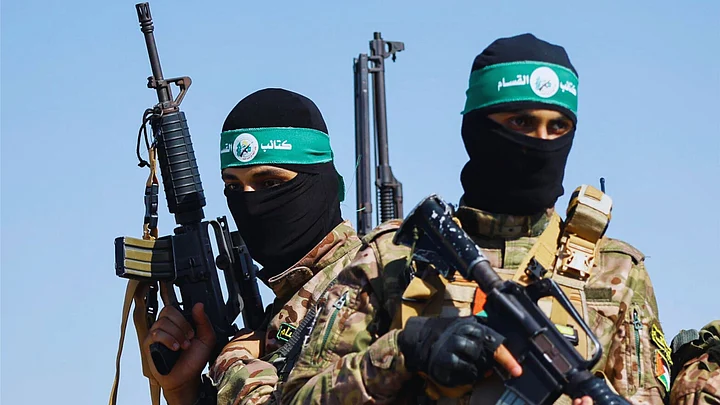Along with the human casualties and material destruction, the 9/11 attacks depicted Islam negatively.
That the largest single human-inflicted deaths were carried out in the name of Islam fuelled negative stereotypes against the religion.
While al-Qaeda did not represent the 1.5 billion global Muslim population at that time, those who carried out these terrorist acts were driven by their commitment to a radical interpretation of Islam and justified their actions in its name.
No matter how hard one tried, the post-2001 spread of Islamophobia across the globe was primarily a fallout of 9/11.
Widespread negative feelings towards Islam and Muslims in the West and elsewhere cannot be delinked from that carnage.
It appears that the Hamas carnage on the Black Sabbath is leading to something similar.
Distancing Hamas From Islam
Evidence of the gruesome actions of Hamas are heart-wrenching: kids being killed in their beds; decapitations; disfiguring and dishonouring of women and children; parading of naked bodies of dead women; kidnapping of elderly women, including those in wheelchairs.
These are neither accidental nor collateral but premeditated slaughter.
Hamas is an acronym for Harakat al-Muqawama al-Islamiya, meaning the Islamic Resistance Movement.
Since its founding in 1988, Hamas has gained popularity and legitimacy. Its social welfare activities in education, welfare, health services, etc., and its image of being less corrupt provided greater acceptance and legitimacy among the Palestinians.
When Izz ad-Din al-Qassam—the military wing of Hamas—admitted to carrying out several suicide bombings against Israeli following the Oslo Accords, the international mood changed. In October 1997, the US designated Hamas as a terrorist organization, and gradually, the European Union followed this practice, especially after 9/11.
Are the violent activities of Hamas on 7 October in sync with Islam, which the organisation claims to represent or rooted in? Are the premeditated killing of women, children, sick and elderly permitted in the Quran, sunnah or any Islamic jurisprudence?
There are conflicting voices in the region. Some have tried to distance Hamas actions from Islam, while its activists are distancing Hamas from the reality of 7 October.
Prominent Hamas leaders are creating an alternative reality. Unable to justify what happened on that sabbath within Islam, Hamas leader-in-exile Khalid Masha’al categorically told Saudi-based Al-Arabiya News network: “Hamas does not kill civilians on purpose. It focuses on the soldiers. Period.”
Either he is not following the events or considers children and elderly women as ‘soldiers.’ Admitting that Hamas practices are not in sync with Islamic values will make the movement illegitimate and even unIslamic; hence, Masha’al takes refuge under the Islamic proscribing of killing women and children.
Another Hamas leader, Musa Abu Marzuk, went a step further. In an exclusive interview with Frontline, he blamed Israel for the death of its civilians. In his words, Hamas militants killing of Israeli civilians “are false Israeli narratives… our freedom-fighters did not kill them… those who killed Israeli civilians was their army…according to the confessions of some Israelis… Israeli army killed many (Israeli) civilians when it fired missiles.”
The journalist who interviewed him and the Indian fortnightly that carried these words conveniently ignored any fact-checking and conveyed a false narrative that since Israeli civilians were killed by the Israeli army, the Islamic movement should be absolved of any involvement in the slaughter.
At the Same Time, There Are Saner Voices in the Region
Leading those sane voices against Hamas' actions is former Saudi Ambassador to the US and the UK Turki al-Faisal.
Speaking at Baker Institute in Austin, Taxus remarked: “I categorically condemn Hamas's targeting of civilian targets of any age or gender as it is accused of. Such targeting belies Hamas's claims to an Islamic identity. There is an Islamic injunction against the killing of innocent children, women, and elders. The injunction is also against the desecration of places of worship."
Likewise, reflecting general revulsion over the slaughter, a woman journalist working for Saudi TV Al-Arabia asked Masha’al: “You claim that the resistance is legitimate in your eyes, but what the Western world saw on its television screens was the Hamas movement harming Israeli citizens. The world compares the movement that you are responsible for, among other things, for its image abroad, to ISIS.”
Until now, such questions were considered the prerogative of Western journalists. That several Palestinian figures vehemently reject the Hamas-ISIS comparison also underscores their vulnerability to such parallels.
Egyptian President Fattah el-Sisi’s efforts to mediate the conflict inhibit the venerable al-Azhar, Egypt’s largest and oldest religious institution, from issuing its views on the Hamas brutality; so far, its public statements are confined to supporting Palestinian rights.
Should el-Sisi’s efforts falter, one should expect a more vocal pronouncement from Al-Azhar, which has been speaking against religious extremism and radicalism in Egypt and the wider Middle East. The Ulema in the Middle East, most of whom are closely associated with the establishment, are waiting for the right signals.
Distinguishing Between Hamas and Palestinians
One has to distinguish between the recent actions of Hamas and the larger Palestinian cause.
The militant Islamic movement vehemently opposes such a divorce lest its legitimacy becomes questionable.
If its actions are perceived, let alone declared, as unIslamic or against the grain of Islam, Hamas will be delegitimised. This is the larger problem facing it.
While it can withstand the Israeli military offensive, even a ground invasion of the Gaza Strip, its political legitimacy rests on its Islamic credentials.
Hence, we see the vehement opposition by Hamas and its supporters to any parallels between Hamas and ISIS and any association of the movement with the killing of civilians.
At the same time, the continued silence of the statespersons, the ulema, political leaders, and community figures on the unIslamic actions of Hamas will eventually cause another 9/11 moment, not just for the Palestinians but also for the Arab world and the larger Ummah.
(Kumaraswamy teaches contemporary Middle East in JNU. This is an opinion article and the views expressed are the authors' own. The Quint neither endorses nor is responsible for them.)
